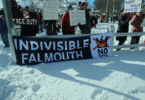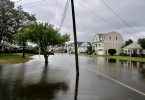PROVINCETOWN – “When I talk to people, we jokingly talk about how it’s Groundhog Day,” said Mary Ellen Dwyer, a clinical social worker with her own practice in mental health.
Besides her private practice, Dwyer is also a volunteer with the Provincetown Covid-19 Task Force, which, among other things, offers a stress hotline for people to call who are feeling anxiety.
What is happening “is not in our structure, not for the majority of people,” she said. The process people are going through, she said, is similar to grieving.
“We have to help people process this loss of normal. And that could be a loss of people for real. It could be financial or emotional security. And we have to [process the loss] in a very concentrated way and in a magnified way that you rarely have to do,” she said.
(SEE ALSO, Small Town, Big Task – Provincetown Covid-19 Task Force)
“Typically when we grieve,” said Dwyer, “we have weeks, months, years to process things.”
But now, the grieving process accelerated and intensified, she said. “We’re mostly helping people with coping skills and mindfulness,” she said.
There are similar four-step processes championed by various authors, she said. One is Stop, Take A Breath, Observe, and Proceed, said Dwyer.
“You want to investigate and nurture yourself,” she said. “We’re teaching people how to go inward and find coping skills.”
“When you are feeling panicky, you stop. What are you aware of? What is going on with your body. How to do some grounding. We’re helping people to stay present and get through this moment and be in this moment,” said Dwyer.
Another four-step process, specifically for grieving, said Dwyer, is Accept, Experience, Adjust, and Reinvest.
“With acceptance, I’m talking about accepting reality,” she said. “That has taken people through various stages. Some get it quickly, some get it more slowly, across our nation and across the world,” she said.
Everyone has their own experience with the new reality, she said. Dwyer said she was supposed go on vacation to Mexico. “We were watching it go across the globe… we were shocked, angry, fearful, and we were sad.”
Others from her own family have missed a funeral, postponed a wedding, and not met a newborn baby, she said. “That’s just a small sample from my own life,” she said.
When it comes to adjustment to the new circumstances, Dwyer said, “Interestingly enough, my clients who have PTSD, anxiety, even depression are doing astonishingly well. Their world hasn’t changed that much. This is their daily norm, heightened hyper-vigilance and anxiety.”
“They are like, welcome to my world,” she said.
The new adjustments are actual life adjustments, said Dwyer. “We have to wear masks. We have to think about what we touch,” she said.
“And going to the grocery store feels so dystopian,” said Dwyer. But it is an adjustment forced on everyone.
The final step, she said, is reinvestment. “If you lost a dog, at some point you get another dog. You are going to date again. If you lost a job… take the energy that you had invested in the person or the concept that we lost and we reinvest it.”
There is one other new part of the anxiety that is not similar to grieving. People on all sides of the political spectrum, she said, “are triggered by national politics. We’re talking about politics a lot.”
SEE ALSO, Small Town, Big Task – Provincetown Covid-19 Task Force
– Please like us on Facebook.
For our other coverage see Cape Cod Covidispatches
































